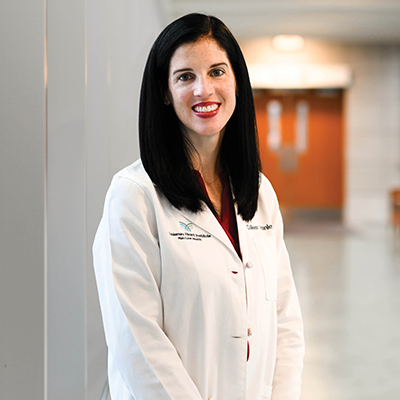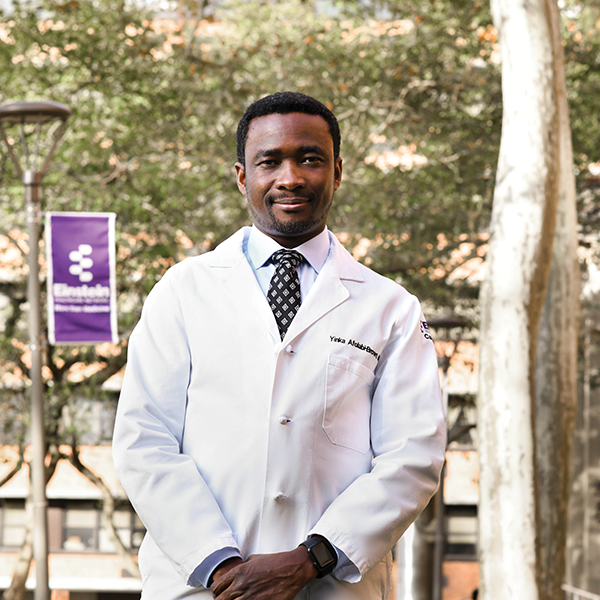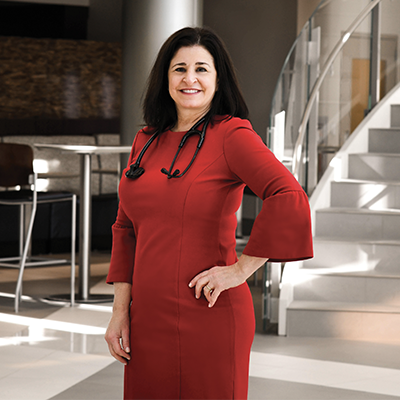Heart Health Champions
The region’s top heart experts dish on the latest advances in heart care and the best ways to stay heart healthy.
Brought to you by Main Line Health Lankenau Heart Institute
Ensuring a Steady Beat
The heart uses electrical pulses to pump blood throughout the body, but sometimes these pulses can become irregular. Colleen Hanley, MD, a cardiac electrophysiologist at Lankenau Heart Institute, part of Main Line Health, explains the role her specialty plays in maintaining good heart health.

What exactly is a cardiac electro-physiologist? Electrophysiologists specialize in treating different types of heart-rhythm disorders and irreg-ular heartbeats, the most common be-ing atrial fibrillation or AFib. Some of these disorders can be controlled with medication, others require intervention. Electrophysiology is still a field that is constantly evolving. It’s a specialty that presents unique challenges that I really enjoy. I love the combination of practicing medicine and working with my hands to do procedures such as pacemaker implantation and cardiac ablations.
How much of a role does prevention play in heart disease? Genetics and family history are risk factors we can’t control, but we can control lifestyle choices. What we do every day can make a big difference. Diet, exercise, getting enough sleep and controlling stressors are all impor-tant. Even if we can’t get rid of the stressors, finding a way to manage them is key, whether it’s through talk therapy, meditation, exercise, or doing something you enjoy. Knowing your numbers—your blood pressure, cholesterol, appropriate weight—is also important. Telling someone to live a healthy lifestyle is nebulous, but creating concrete goals based on their numbers is tangible. And it’s never too late to make lifestyle changes that can impact your future.
Are people with atrial fibrillation (AFib) at a higher risk of stroke? People with atrial fibrillation are at five times increased risk for stroke due to blood clots that can form in the heart. Fragments of these clots can break off, travel in the blood stream to the brain, and cause a blockage in blood flow which leads to a stroke. Once AFib is diagnosed, either by an EKG or through monitoring with a small chip that can be inserted under the skin, we discuss treatment options to prevent stoke related to AFib.
Is there a particular patient who sticks out in your mind? The most memorable for me are the patients who are really suffering with a heart rhythm disorder and are at a loss for what to do. They’ve never been properly diagnosed and are often living with symptoms for years, sometimes even decades. Knowing I can offer a diagnosis and treatment and help them live the rest of their lives without symptoms or worry… those are the most impactful stories to me.
Brought to you by Einstein Healthcare Network
Don’t Ignore Heart Disease Symptoms
Einstein Healthcare Network’s Yinka Afolabi-Brown, MD, talks about the importance of paying attention to heart disease symptoms, especially during the COVID-19 pandemic.

How do women differ from men when it comes to heart disease? Heart disease has been historically viewed as a problem affecting men, which has led to heart disease symptoms in women being under-recognized. Heart disease in women also tends to be underdiagnosed because they don’t always present with classic symptoms like chest pain. In reality, heart disease and certain risk factors for heart disease, such as hypertension, are only more common in men until women reach menopause. After menopause, the prevalence of heart disease in women is similar to men.
What advice do you have for women? It’s important that women advocate for themselves. They shouldn’t minimize their symptoms. Heart disease in a woman can present as being tired, having less energy, indigestion or sudden shortness of breath. If there’s something you feel that is unusual, discuss it with your doctor and make sure your concerns are addressed and not dismissed.
What role do genetics play in heart disease? Genetic testing is very informative in determining if patients may be predisposed to heart disease. Taking a family history is extremely important. Patients need to be open when discussing their family history and proactive about their health. For example, a patient may have heart disease symptoms but put off testing for various reasons. But then, when a serious problem like a heart attack occurs in a family member, the patient realizes the urgency of the situation. The easiest heart problems to treat are the ones we can prevent.
Is there anything new in the treatment of heart disease? Recently, a group of medications used to treat diabetes was found to significantly improve outcomes for patients with heart disease. They reduced the risk of heart attack and heart failure so much that they are now being used predominately for the treatment of heart disease rather than diabetes.
What is the biggest obstacle to staying heart healthy? Most people know what they need to do, but getting them to do it is a challenge. Patients often say they can’t afford to exercise and eat healthy, or they are too busy. I say they can’t afford not to. People need to get out and move; they need to make time for their health. Even taking simple steps throughout the day to increase your activity level can make a difference, like parking farther away and walk-ing, or taking the stairs.
How has the COVID-19 pandemic affected your practice and patients? We noticed a lot less patients were coming to the hospital with urgent cardiac issues—they were delaying medical care for fear of contracting COVID-19. That led to more adverse outcomes for patients during the pandemic. It’s important that people know hospitals are taking the necessary precautions to protect patients from COVID-19, and they should not delay seeking care.
Brought to you by Doylestown Health
When Lifesaving Treatments Imperil the Heart
Lifesaving treatments have significantly increased cancer survivorship, but they can take a toll on the heart. Doylestown Hospital’s Renee Sangrigoli, MD, FACC, discusses the emerging field of cardio-oncology.

What is cardio-oncology? Cardio-oncology is a newer subspecialty that focuses on monitoring and treating heart disease in cancer patients. It’s about improving heart health by minimizing cardiotoxicity during treatment and throughout the patient’s lifetime. While there are many great chemotherapy medications that are curing cancer and putting people into remission, those same drugs may negatively affect a patient’s heart and vascular system—not only during treatment but years later. Oncology patients need to know their risks and understand the importance of lifetime cardiac risk screening.
Can you tell us about the new cardio-oncology program you helped launch? Our cardio-oncology program at Doylestown Hospital brought together professionals from various specialties to develop protocols for evaluating risk and flow patterns for referring at-risk oncology and radiation patients to the clinical care coordinator and cardiology group. Our program includes cardiology and oncology practices, breast surgeons, radiation oncologists, physician assistants, a nurse practitioner with a survivorship specialty, administrators, case managers, and two high-level pharmacists. It’s our goal to minimize the cardiotoxicity from cancer treatment and improve quality of life and survivorship.
What still needs to be done in the area of women and heart disease? Women have historically been un-derrepresented in cardiac research trials. Most of the data we have are from studies with men. Raising awareness and recruiting women for trials is essential.
What do you do to stay heart healthy? I eat well, watch my blood pressure and control my cholesterol. I also exercise, which has been a challenge during the pandemic. My husband and I bought an exercise bike because we could no longer go to the gym. We’re also passionate about travel and now that we can’t go any-where, it’s nice to go ‘riding through the country’ on the bike. I tell all my patients to have a COVID fitness plan.
Is there a patient who stands out in your mind? I recently saw a 65-year-old woman who was experiencing shortness of breath and chest symp-toms. Her EKG results were normal, so her physician concluded that her symptoms were due to her weight. When she came to me for a second opinion and told me she had received chemotherapy and radiation for breast cancer five years earlier, that was a red flag regarding her cardiac risk. I ordered a stress test that was positive. I also diagnosed her with carotid artery disease even though she had none of the ‘usual’ risk fac-tors. Following the placement of a cardiac stent, the patient no longer has chest discomfort, can exercise again, and has improved her quality of life. The goal of our program is to educate both physicians and patients that cancer treatment can increase cardiovascular risk and assist them in managing this risk.
